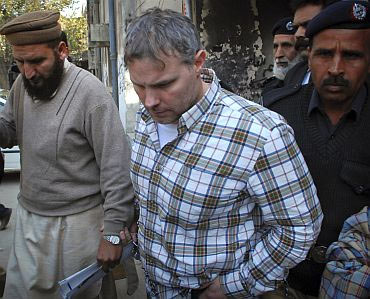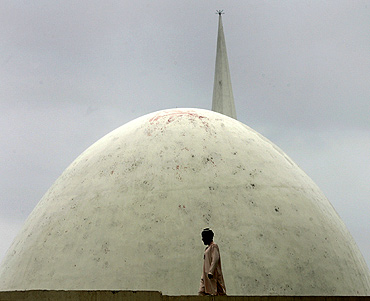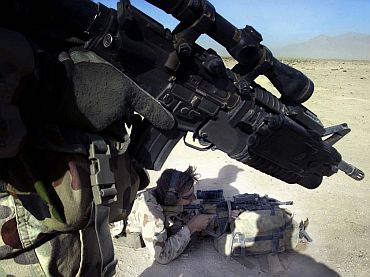 | « Back to article | Print this article |
After Davis arrest, American secret agents flee Pakistan
Last updated on: February 28, 2011 15:45 IST
At least 30 suspected covert US operatives have suspended their activities in Pakistan and 12 have left the country following the arrest of CIA contractor Raymond Davis late last month, according to a media report. In the wake of Davis' arrest in Lahore on January 27 for gunning down two men, Pakistan's intelligence agencies began scrutinising records of Americans living in the country and discovered "several discrepancies".
This caused "many suspected American operatives to maintain a low profile and others to leave the country altogether", The Express Tribune newspaper quoted its sources as saying.
'Are the 'special Americans' covert operatives in Pakistan'
Last updated on: February 28, 2011 15:45 IST
The Pakistan Foreign Ministry states there are 851 Americans with diplomatic immunity in Pakistan, of whom 297 are not working in a diplomatic capacity. Sources in the Interior Ministry told the daily that the number of US non-diplomats is 414. The majority of these "special Americans", as the Interior Ministry refers to them, are concentrated in Islamabad, while others live in Karachi, Lahore and Peshawar.
Interior Ministry records state most of the "special Americans" live in upscale neighbourhoods in Islamabad and Lahore, with smaller presences in Karachi and Peshawar, the report said.
Most of these Americans are "suspected of being operatives of US intelligence agencies who are on covert missions in Pakistan" and report to the US Joint Special Operations Command, according to the sources.
Pak has refused to release Davis
Last updated on: February 28, 2011 15:45 IST
Davis was arrested after he shot and killed two armed men he claimed were trying to rob him. Pakistani leaders, fearful of a public backlash due to rising anti-American sentiments, have rebuffed US demands to release him on grounds of diplomatic immunity and said his case will be decided by the courts.
Pakistani counter-intelligence agencies have long suspected a covert US espionage presence in the country and the first internal investigation into suspicious activities by American citizens was conducted in March 2009.
This "revealed some significant gaps in the implementation of laws concerning foreign citizens", the report said.
'Senior army officers rented houses to the Americans'
Last updated on: February 28, 2011 15:45 IST
Under the Foreigners Act of 1946, foreigners are not allowed to live in cantonment areas in Pakistan. However, a majority of suspected American intelligence operatives in Lahore are reportedly "living in the Officers'-Generals' Colony on Sarwar Road and Cavalry Ground in the Lahore Cantonment," the report said.
Several senior retired army officers of the rank of brigadier to lieutenant general have rented out their homes to Americans at rates "astronomically higher than the rents of similar homes in the area," the report said.
The presence of these Americans came to light when several serving and retired army officers who lived in these areas reported suspicious activity, including unauthorised foreigners living in cantonment areas.
Pak intel believes the Americans to be Delta force operatives
Last updated on: February 28, 2011 15:45 IST
Foreign citizens in Pakistan have to obtain a no-objection certificate from security agencies before they can rent a residence. This process is meant to ensure that they are not living in prohibited areas. But somehow American citizens were able to get NOCs issued to live in cantonment areas in violation of the law.
Sources told the daily that intelligence agencies' reports stated many Americans living in these residences are assumed to be US Special Forces including members of the covert Delta Force of the US Army and therefore are considered armed and dangerous.
The reports further claimed that the late US Special Representative Richard Holbrooke had visited one of the covert American teams in Lahore at a residence on Sarwar Road owned by a retired army general.
© Copyright 2025 PTI. All rights reserved. Republication or redistribution of PTI content, including by framing or similar means, is expressly prohibited without the prior written consent.




